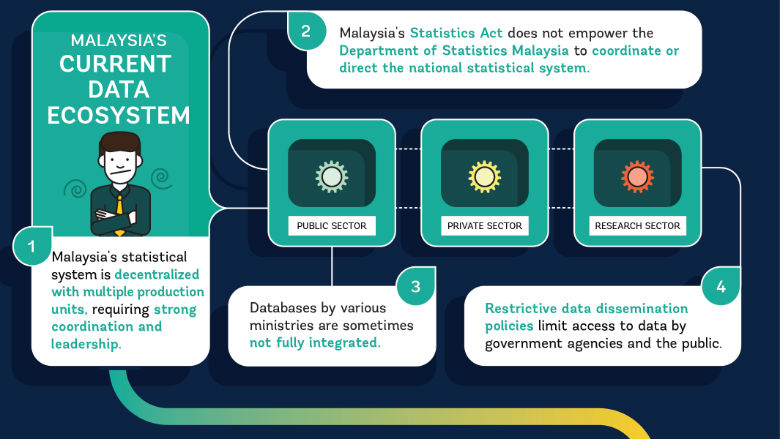Key Findings
Malaysia’s economic outlook proves favorable with economic growth expanding in the first quarter of 2017.
- The gross domestic product (GDP) growth rate is predicted to rise to 4.9% for 2017, which is slightly higher than the current projection range of 4.3-4.8%.
- Private consumption is projected to remain as the main propeller of growth, backed by ongoing private investments which saw a moderate growth driven by implementations of new and ongoing projects.
- Fiscal consolidation is expected to stay on track with efforts poised to continue well into 2017.
- The potential risks to Malaysia’s economic growth are primarily external ones, stemming from threats of trade protectionism in the US fiscal stimulus and trade policies, and from the impacts of potential fluctuations in global commodity prices.
Data is becoming increasingly relevant for economic development. For Malaysia to achieve high-income status by 2020, improving the availability and quality of data can further drive productivity in the private sector and academic research, as well as make public service delivery more efficient.
- As of 2015, Malaysia ranked 51 for Open Data, or the ability to make government-data publicly available, and lower compared to regional and advanced economies.
- Improving Malaysia’s Open Data environment is needed to match the data ecosystem of high-income economies. The Department of Statistics Malaysia (DSOM) is making significant efforts to expand their production of data by modernizing its systems and performances to streamline it along international standards.
- The report highlights that an increased volume of high-quality data is highly correlated with development. Effective data management is crucial for policymaking and public service delivery.
- Data collaboration among data producers and the Malaysian government is key in order to cope with fragmentation in the system, and can provide an effective mechanism for the Department of Statistics to form group alliances with external partners. Furthermore, data producers play a major role in raising the quantity and quality of data through data collection, dissemination, collaboration and user feedback.
- As Malaysia works toward becoming a high-income economy, statistical offices should gradually move to forming a more integrated system, thus creating a cohesive value chain of statistics production which can effectively reduce the overall cost of data collection. Higher quality and more granular data is essential for Malaysia’s research productivity and climate.

